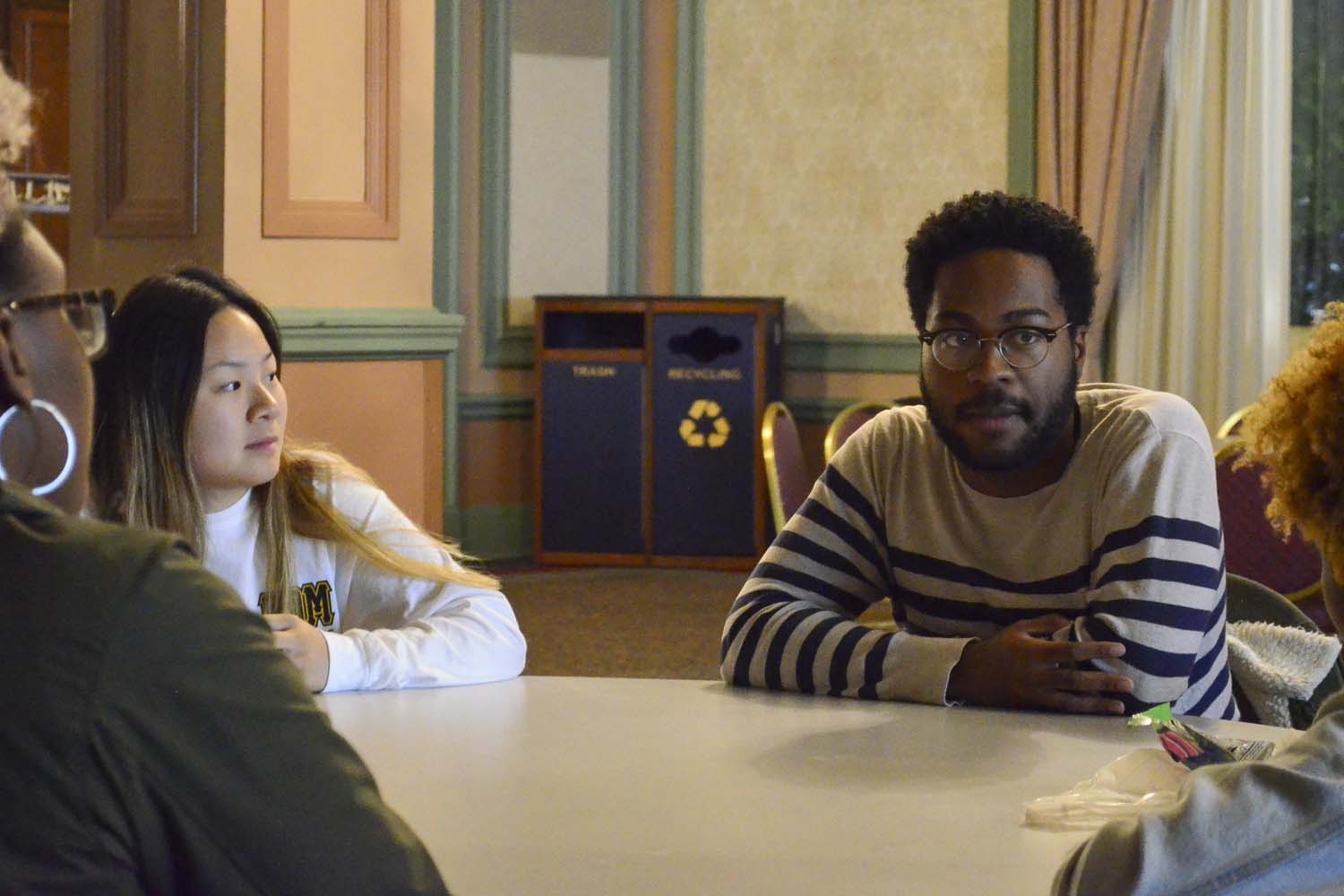Creating an intersectional conversation around mental health


SGB president Zechariah Brown speaks at Monday evening’s “Mental Health and Intersectionality: A Roundtable Discussion.”
According to the National Alliance on Mental Illness, nearly half of non-Hispanic white Americans get treatment for mental illness, but only 30% of black or African Americans do.
Similar trends can be seen in other marginalized communities in America. Members of the LGBTQ+ community, for example, are more likely to experience mental health issues than those outside the community. Over 37% of LGBTQ+ adults experience mental health issues — considerably more common than the 20% of American adults.
In an effort to make the conversation around mental illness more inclusive, a group of about 20 met in the William Pitt Union’s Kurtzman Room Monday night for a roundtable to discuss mental health and intersectionality.
The conversation centered around the barriers people face when accessing mental health treatment, including stigma, cost and culture.
Groups of students rotated from table to table, joining discussions led by five speakers, including Toya Jones, a lecturer in Pitt’s School of Social Work, Sean Moundas, a Counseling Center staff member and several student leaders.
Moderators asked the attendants to consider mental health — not just their own experiences, but also the larger implications. Some participants said the wider conversation tends to gloss over what good mental health looks like while only focusing on instances of poor mental health. Several students agreed that talking about good mental health would help them in their personal recovery.
Attendees also discussed the image that pops into their head when they hear the phrase “mental illness.” The word “ill” can create a negative first connotation. But, in fact, more people have a mental illness than many realize. According to NAMI, one in five U.S. adults experience mental illness each year.
Dina Condeluci, a senior natural sciences major, said it’s important to talk about mental illness because it’s so widespread.
“It’s important because a lot of people have mental health issues,” Condeluci said. “Even if it’s not affecting you directly then it’s still affecting you indirectly through a friend or a family member.”
Jones said in addition to the general stigma around mental illness, she’s found that people of color can experience stigma from their communities as well. In the black community, Jones said, people rely on their faith and their family — they don’t often turn to therapy.
“If we are seeking professional help, like therapy, then that negative stigma is we are weak,” Jones said.
In black culture, Jones said, one also turns to the community for support. Unfortunately, according to Jones, therapy typically takes a Eurocentric approach — one that doesn’t resonate with or help black patients.
“Educating clinicians of the dominant race and dominant culture so that they are not adhering to the institutionalized racism so that they are not then racially injuring their clients [is key],” Jones said.
This reluctance towards therapy isn’t specific to the African American community. Some children of immigrants said they felt unreasonable for experiencing mental health issues when they had had a relatively easy life.
Intersectionality extends to LGBTQ+ issues as well — as mental health issues are more prevalent among the LGBTQ+ community than the general public.
Calvin Ecker, the social action chair of the Rainbow Alliance and a speaker at the event, said he was happy to see LGBTQ+ issues included in the topic of intersectionality.
“It felt good to talk about LGBTQ+ topics in a space where they’re not always talked about,” Ecker said.
Some attendees agreed that an approach to fixing the way mental health is viewed needs to focus on intersectionality and felt that any change must include people of color. Monday’s event was only the first step, Condeluci said. She wants this conversation to be casual and commonplace so it will lead to real change.
“I hope that everyone can actually take this discussion and apply it in their daily lives,” Condeluci said.
Ecker said the event changed his perspective, and that he plans to continue the discussions in his daily life.
“It was really eye-opening, not only for me as an LGBT person but for me as a person with mental health issues and as a person who just exists in the world,” Ecker said.
Recent Posts
Take Madness Final Four | Battle of Pennsylvania, 412 and Just Outside of Philly clash
Welcome to the Final Four of Take Madness! We are down to four talented writers,…
Column | Best Sports Environments in Pittsburgh
Pittsburgh is undoubtedly one of the best sports cities in America. A deeply passionate fanbase…
Chalk is all the talk: Previewing the NCAA men’s Final Four
For the first time since 2008, all four first seeds have made the men’s Final…
The Sweet Sixteen was bittersweet for college basketball diehards
This year’s NCAA tournament is simply madness. With each new round, there is a new…
Four realistic transfers for Pitt men’s basketball
Now that the NCAA Transfer Portal is in full swing, Pitt men’s basketball has the…
Opinion | The academic’s guide to making time for the people you love
As a student who spent all of high school — and now college — determined…

